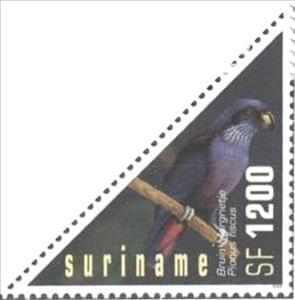Stamp: Dusky Parrot (Pionus fuscus) (Suriname 2002)
Dusky Parrot (Pionus fuscus) (Suriname 2002)
09 January (Suriname ) within release Parrots goes into circulation Stamp Dusky Parrot (Pionus fuscus) face value 1200 Surinamese guilder
| Stamp Dusky Parrot (Pionus fuscus) in catalogues | |
|---|---|
| Michel: | Mi:SR 1812 |
Stamp is square format.
Also in the issue Parrots:
- Stamp - Mealy Amazon (Amazona farinosa) face value 5325;
- Stamp - Red-fan Parrot (Deroptyus accipitrinus) face value 150;
- Se-tenant - Red-fan Parrot (Deroptyus accipitrinus),Yellow-crowned Amazo face value 2*150;
- Stamp - Yellow-crowned Amazon (Amazona ochrocephala) face value 150;
- Stamp - Red-bellied Macaw (Orthopsittaca manilatus) face value 200;
- Se-tenant - Red-bellied Macaw (Orthopsittaca manilatus), Blue-cheeked Am face value 2*200;
- Stamp - Blue-cheeked Amazon (Amazona dufresniana) face value 200;
- Stamp - Chestnut-fronted Macaw (Ara severus) face value 800;
- Se-tenant - Chestnut-fronted Macaw (Ara severus), Black-headed Parrot (P face value 2*800;
- Stamp - Black-headed Parrot (Pionites melanocephala) face value 800;
- Stamp - Red-shouldered Macaw (Ara nobilis) face value 1200;
- Se-tenant - Red-shouldered Macaw (Ara nobilis), Dusky Parrot (Pionus fus face value 2*1200;
- Stamp - Dusky Parrot (Pionus fuscus) face value 1200;
- Stamp - Crimson Macaw (Ara chloroptera) face value 1700;
- Se-tenant - Crimson Macaw (Ara chloroptera), Caica Parrot (Pionopsitta c face value 2*1700;
- Stamp - Caica Parrot (Pionopsitta caica) face value 1700;
- Stamp - Scarlet Macaw (Ara macao) face value 5325;
- Se-tenant - Scarlet Macaw (Ara macao), Mealy Amazon (Amazona farinosa) face value 2*5325;
Stamp Dusky Parrot (Pionus fuscus) it reflects the thematic directions:
Birds (Aves), a subgroup of Reptiles, are the last living examples of Dinosaurs. They are a group of endothermic vertebrates, characterised by feathers, toothless beaked jaws, the laying of hard-shelled eggs, a high metabolic rate, a four-chambered heart, and a strong yet lightweight skeleton. Birds live worldwide and range in size from the 5 cm (2 in) bee hummingbird to the 2.75 m (9 ft) ostrich. They rank as the class of tetrapods with the most living species, at approximately ten thousand, with more than half of these being passerines, sometimes known as perching birds. Birds are the closest living relatives of crocodilians.
Parrots (Psittaciformes), also known as psittacines (/ˈsɪtəsaɪnz/), are birds with a strong curved beak, upright stance, and clawed feet. They are classified in four families that contain roughly 410 species in 101 genera, found mostly in tropical and subtropical regions. The four families are the Psittaculidae (Old World parrots), Psittacidae (African and New World parrots), Cacatuoidea (cockatoos), and Strigopidae (New Zealand parrots). One-third of all parrot species are threatened by extinction, with a higher aggregate extinction risk (IUCN Red List Index) than any other comparable bird group Parrots have a generally pantropical distribution with several species inhabiting temperate regions as well. The greatest diversity of parrots is in South America and Australasia
The Kionga Triangle (German: Kionga-Dreieck, Portuguese: Triângulo de Quionga) was a small region of German East Africa situated at the mouth of the Ruvuma River. The Ruvuma served as the border between the German colony and Portuguese Mozambique, and the Kionga Triangle was the only section of German East Africa south of the river. Its principal settlement was Kionga (now Quionga ) which had a population of 4,000 in 1910. It became a German possession in 1894 but came under Portuguese control in April 1916 during World War I. The post-war Treaty of Versailles reaffirmed that the river was the border between Tanganyika, then under British control, and Portuguese Mozambique. The triangle was the only territory that the treaty awarded to Portugal.


